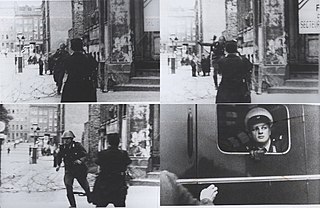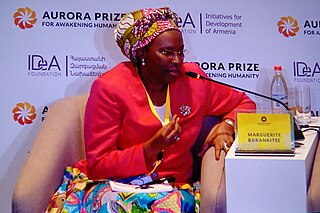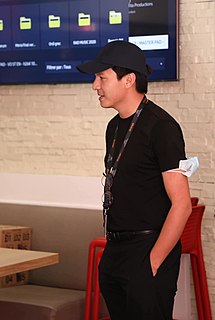Related Research Articles

The International Organization for Migration (IOM) is a United Nations agency that provides services and advice concerning migration to governments and migrants, including internally displaced persons, refugees, and migrant workers.

A refugee, generally speaking, is a displaced person who has crossed national boundaries and who cannot or is unwilling to return home due to well-founded fear of persecution. Such a person may be called an asylum seeker until granted refugee status by the contracting state or the United Nations High Commissioner for Refugees (UNHCR) if they formally make a claim for asylum. The lead international agency coordinating refugee protection is the United Nations Office of the UNHCR. The United Nations has a second office for refugees, the United Nations Relief and Works Agency (UNRWA), which is solely responsible for supporting the large majority of Palestinian refugees.
An asylum seeker is a person who leaves their country of residence, enters another country and applies for asylum in this other country. An asylum seeker is an immigrant who has been forcibly displaced and might have fled their home country because of war or other factors harming them or their family. If their case is accepted, they become considered a refugee. The terms asylum seeker and refugee are often confused.

The Dublin Regulation is a European Union (EU) law that determines which EU Member State is responsible for the examination of an application for asylum, submitted by persons seeking international protection under the Geneva Convention and the EU Qualification Directive, within the European Union. It is the cornerstone of the Dublin System, which consists of the Dublin Regulation and the EURODAC Regulation, which establishes a Europe-wide fingerprinting database for unauthorised entrants to the EU. The Dublin Regulation aims to "determine rapidly the Member State responsible [for an asylum claim]" and provides for the transfer of an asylum seeker to that Member State.

The right of asylum is an ancient juridical concept, under which people persecuted by their own rulers might be protected by another sovereign authority, like a second country or another entity which in medieval times could offer sanctuary. This right was recognized by the Ancient Egyptians, the Greeks, and the Hebrews, from whom it was adopted into Western tradition. René Descartes fled to the Netherlands, Voltaire to England, and Thomas Hobbes to France, because each state offered protection to persecuted foreigners.
Non-refoulement is a fundamental principle of international law that forbids a country receiving asylum seekers from returning them to a country in which they would be in likely danger of persecution based on "race, religion, nationality, membership of a particular social group or political opinion". Unlike political asylum, which applies to those who can prove a well-grounded fear of persecution based on certain category of persons, non-refoulement refers to the generic repatriation of people, including refugees into war zones and other disaster locales. It is a principle of customary international law, as it applies even to states that are not parties to the 1951 Convention Relating to the Status of Refugees or its 1967 Protocol. It is also a principle of the trucial law of nations.

Marguerite (Maggie) Barankitse is a humanitarian activist who works to improve the welfare of children and challenge ethnic discrimination in Burundi. After rescuing 25 children from a massacre, she was forced to witness the conflicts between the Hutu and Tutsi in her country in 1993. She established Maison Shalom, a shelter that provided access to healthcare, education, and culture to over 20,000 orphan children in need. Because she protested against a third term for President Nkurunziza, she lives in exile.
An unaccompanied minor is a child without the presence of a legal guardian.

Asylum in the European Union (EU) has its roots in the 1951 Convention Relating to the Status of Refugees, an agreement founded on Article 14 of the Universal Declaration of Human Rights. Following the adoption of the 1985 Schengen Agreement on the elimination of internal border controls of signatory states and its subsequent incorporation into the EU legislative framework by the 1997 Amsterdam Treaty, the EU set up, in 2011, a Common European Asylum System (CEAS) to unify minimum standards related to asylum. The latter, however, still left up to EU Member States the discretion to establish procedures for obtaining and withdrawing international protection. The reforms implemented in the aftermath of the 2015 European migrant crisis culminated in the creation of the European Union Agency for Asylum on 19 January 2022, which will promote greater convergence of the different member states asylum and reception practices and ensure that high EU-standards are the guide.
Ngô Đình Lệ Quyên, was a South Vietnamese-born Italian lawyer who served as Commissioner of Immigration for the city of Rome.

The Calais Jungle was a refugee and migrant encampment in the vicinity of Calais, France that existed from January 2015 to October 2016. There had been other camps known as jungles in previous years, but this particular shanty town drew global media attention during the peak of the European migrant crisis in 2015, when its population grew rapidly. Migrants stayed at the camp while they attempted to enter the United Kingdom, or while they waited for their French asylum claims to be processed.

The European Commission's Asylum, Migration and Integration Fund is a funding programme managed by the Directorate-General for Migration and Home Affairs which promotes the efficient management of migration flows and the implementation, strengthening and development of a common approach to asylum and immigration in the European Union. All EU Member States except Denmark participate in the implementation of this Fund. Most of the funds are provided to the EU Member States for activities addressing previously agreed upon themes. A part of the funding is reserved for emergency assistance. A final part is reserved for Union Actions, which are European Commission managed projects that are developed as either calls for proposals, direct awards, procurements, or delegation agreements.
The code of entry and residence of foreigners and right of asylum, in French "code de l'entrée et du séjour des étrangers et du droit d'asile" (CESEDA), is the legal code compiling French laws and regulations related to the rights of foreigners on French soil which was created on November 24, 2004 order proposed by Dominique de Villepin, then French minister of the interior in the government led by Jean-Pierre Raffarin.
Seeking asylum in France is a legal right that is admitted by the constitution of France. Meanwhile, the status of recognised asylum seekers is protected by corresponding laws and Convention Relating to the Status of Refugees, which France signed on 25 July 1951. France is considered to be one of the main asylum host countries in Europe. In 2017 there were 337,143 refugees registered, and up to the end of 2018, 20,710 new asylum seekers had been given legal status to reside in France. Asylum policies in France are regarded as a concerned topic among the public and politicians, and some controversies also exist in the current system of French asylum policies, such as issues on the assimilation policy, national security problems and living conditions of asylum seekers.
The subsidiary protection in French asylum law is granted to an individual whom is exposed to a major threat in his or her home country without benefiting from the refugee status.
The Bureau d'Accueil et d'Accompagnement des Migrants (BAAM) is a French association created in 2015 in Paris to help migrants, particularly refugees and asylum-seekers. It was created after the expulsion of nearly 900 refugees from the high school building they were occupying, in the 19th arrondissement of Paris. The BAAM provides daily support to refugees, asylum-seekers and migrants but also cultural activities and alerts public opinion and politics in order to improve migrants welcoming in France.
Migration policy of the European Union - is a set of principles and measures used by member countries of the European Union aimed to regulate migration processes in the EU zone.
The Primo Levi center is a care center in Paris for people who are victims of torture and political violence in their country of origin and today refugees in France. These people are seen by doctors, psychologists and a physiotherapist. They can also receive the help of a social worker and a lawyer.

Mortaza Behboudi is a Franco-Afghan journalist and documentary filmmaker. In 2019, he was featured in Forbes 30 under 30 in the category of Media and Marketing for his work on Guiti News.
References
- ↑ "Nos positions - France terre d'asile". www.france-terre-asile.org. Retrieved 2019-06-21.
- ↑ "L'association". www.maison-migrations.tn. Retrieved 2019-06-21.
- ↑ "La section Tunisie". www.maison-migrations.tn. Retrieved 2019-06-22.
- ↑ "Le directeur de France Terre d'Asile dans la tourmente". FIGARO. 2013-12-05. Retrieved 2019-06-22.
- ↑ "Associations : à qui profitent les subventions ?". Le Monde.fr (in French). Retrieved 2019-06-23.
- ↑ Admin, FTDA. "LECTURE : " Groom ", nouveau magazine BD sur l'actualité 2015". France terre d'asile (in French). Retrieved 2019-06-23.
- ↑ L’accueil étatisé des demandeurs d’asile : de l’enrôlement dans les politiques publiques à l’affaiblissement des mobilisations de soutien aux exilés. Jérôme Valluy, Terra Nova, février 2007